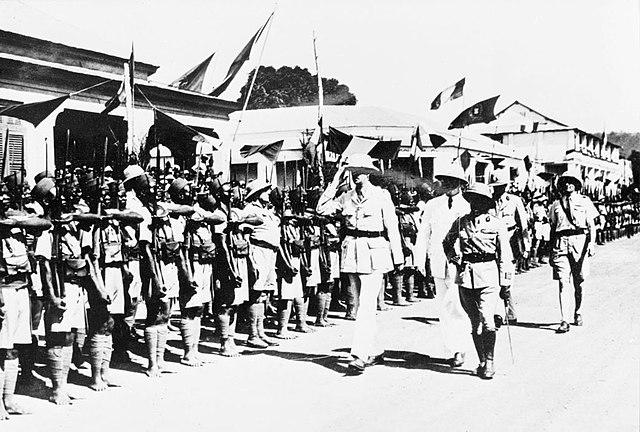Bangui is the capital and largest city of the Central African Republic. It was established as a French outpost in 1889 and named after its location on the northern bank of the Ubangi River ; the Ubangi itself was named from the Bobangi word for the "rapids" located beside the settlement, which marked the end of navigable water north from Brazzaville. The majority of the population of the Central African Republic lives in the western parts of the country, in Bangui and the surrounding area.
Dolisie and Chief Gbembo sign a pact in 1889 leading to Bangui's founding (commemorated on a 1989 stamp)
A local woman together with Free French soldiers near Bangui in 1940
Bangui in 1960
A family shelters from the sun under tarpaulins from a refugee camp with bricks to rebuild their homes around them in the PK5 neighbourhood.
The Central African Republic (CAR), formerly known as Ubangi-Shari, is a landlocked country in Central Africa. It is bordered by Chad to the north, Sudan to the northeast, South Sudan to the east, the Democratic Republic of the Congo to the south, the Republic of the Congo to the southwest, and Cameroon to the west. Bangui is the country's capital and largest city, at the border with the Democratic Republic of the Congo. The Central African Republic covers a land area of about 620,000 square kilometres (240,000 sq mi). As of 2021, it had an estimated population of around 5.5 million. As of 2024, the Central African Republic is the scene of a civil war, which has been ongoing since 2012.
The Bouar Megaliths, pictured here on a 1967 Central African stamp, date back to the very late Neolithic Era (c. 3500–2700 BCE).
Charles de Gaulle in Bangui, 1940
Jean-Bédel Bokassa, self-crowned Emperor of Central Africa.
Rebel militia in the northern countryside, 2007








